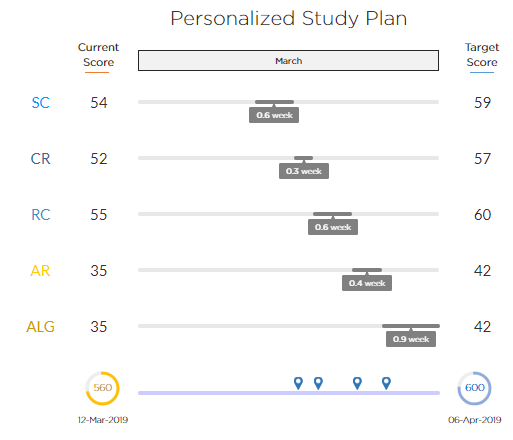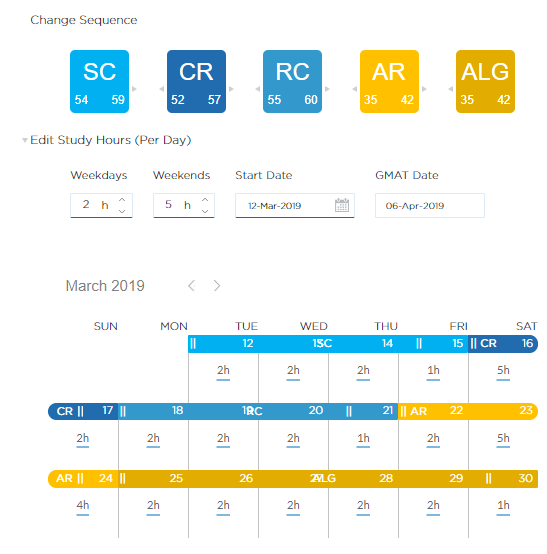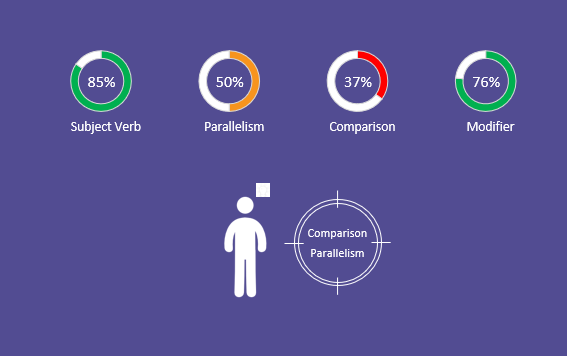EMPOWERgmatRichCQuote:
Hi Jarrie,
With a 560, you're closer to a 600+ than you probably realize. GMAC has publicly stated that the Official Score that you earn on Test Day is within about +/- 30 points of actual ability. Assuming a similar 'swing' in how your CATs function, your various CAT score results - along with your Official Score - show that you essentially performed the same each time (about 600 +/- a few points). You handle certain aspects of the GMAT consistently well, but you also make certain consistent mistakes. The 'swings' in your Verbal Scaled Scores are likely due to a couple of lucky/unlucky 'guesses' in the Verbal section.
Based on your Q40/V27, you can actually pick up all of the missing points that you're after in the Quant section (meaning that you don't necessarily have to improve much - if at all - in the Verbal section to earn a 600+). It's worth noting that the Quant section of the GMAT is NOT a 'math test', so you don't have to become a 'math genius' to pick up those points in that section.
Based on the information that you have provided - and your goals - purchasing the ESR is probably NOT necessary. However, while the ESR doesn't provide a lot of information, there are usually a few data points that we can use to define what went wrong (and what you should work on to score higher). If you purchase the ESR, then I'll be happy to analyze it for you.
Before I can offer you the specific advice that you’re looking for, it would help if you could provide a bit more information on your timeline and your goals:
1) What application deadline(s) are you currently facing?
2) Going forward, how many hours do you think you can consistently study each week?
GMAT assassins aren't born, they're made,
Rich
Dear Rich,
Thank you so much for your detailed explanation! This means a lot.
My application deadline is on the 31st of May 2019. However, I hope to submit everything mid April the latest I have a planned vacation and certainly don't want to ruin it with gmat

)
I am now studying full time at home and I can easily allocate my 6 hours a day on my prep.
I purchased ESR, wish I saw your post earlier

.... but I am not allowed to attached the file on this post (I have to be a member at least 5 days and have at least 5 posts)

So below are the summary in text I copy paste from my ESR report.. Please let me know if there another way to share my ESR file...
VERBAL
• Your Verbal score of 27 is higher than 46% of GMAT Exam scores recorded in the past three years. The mean score for this section is 27.04.
• Your performance on Critical Reasoning questions was equivalent to a score of 28, which is better than 49% of GMAT Exam scores recorded in the past three years. The mean score for this sub-section is 27.59.
◦ Your performance of 75% on Analysis/Critique questions is considered Above Average.
◦ Your performance of 50% on Construction/Plan questions is considered Weak.
• Your performance on Reading Comprehension questions was equivalent to a score of 30, which is better than 57% of
GMAT Exam scores recorded in the past three years. The mean score for this sub-section is 27.29.
◦ Your performance of 66% on Identify Inferred Idea questions is considered Above Average.
◦ Your performance of 75% on Identify Stated Idea questions is considered Above Average.
• Your performance on Sentence Correction questions was equivalent to a score of 23, which is better than 34% of GMAT Exam scores recorded in the past three years. The mean score for this sub-section is 27.19.
◦ Your performance of 60% on Grammar questions is considered Average.
◦ Your performance of 28% on Communication questions is considered Very Weak.
• You completed 36 questions in the Verbal section.
• You responded correctly to 50% of the first set of questions, 71% of the second set of questions, 43% of the third set of
questions and 63% of the final set of questions.
• The average difficulty of questions presented to you in the first set of questions was Medium, the average for the
second set of questions was Medium , the average for the third set of questions was Medium and was Medium for the
final set of questions.
• The average time it took you to respond to the first set of questions presented was 1:43, the average time for the
second set of questions was 2:13, the average time for the third set of questions was 0:55 and 2:13 for the final set of
questions.
QUANT
Your Quantitative score of 40 is higher than 39% of GMAT Exam scores recorded in the past three years. The mean score for this section is 39.93.
• Your performance on Problem Solving questions was equivalent to a score of 39. Your score is better than 35% of all sub-section scores recorded in the past three years. The mean for all test takers is 39.91.
• Your performance on Data Sufficiency questions was equivalent to a score of 42. Your score is better than 41% of all sub-section scores recorded in the past three years. The mean for all test takers is 39.94.
• Your performance on Arithmetic questions was equivalent to a score of 35. Your score is better than 26% of all sub- section scores recorded in the past three years. The mean for all test takers is 40.02.
• Your performance on Algebra/Geometry questions was equivalent to a score of 47. Your score is better than 59% of all sub-section scores recorded in the past three years. The mean for all test takers is 39.88.
• Your performance of 75% on Geometry questions is considered Above Average.
• Your performance of 80% on Rates/Ratio/Percent questions is considered Above Average.
• Your performance of 66% on Value/Order/Factors questions is considered Above Average.
• Your performance of 80% on Equal./Inequal./Alg. questions is considered Above Average.
• Your performance of 40% on Counting/Sets/Series questions is considered Weak.
• You completed 31 questions in the Quantitative section.
• You responded correctly to 57% of the first set of questions, 86% of the second set of questions, 71% of the third set of
questions and 57% of the final set of questions..
• The average difficulty of questions presented to you in the first set of questions was Medium, the average for the
second set of questions was Medium, the average for the third set of questions was Medium and was Medium for the
final set of questions.
• The average time it took you to respond to the first set of questions presented was 1:12, the average time for the
second set of questions was 2:00, the average time for the third set of questions was 2:20 and 2:35 for the final set of
questions.
Again, many thanks for your kind attention.
Have a fantastic day ahead!
Jarrie










